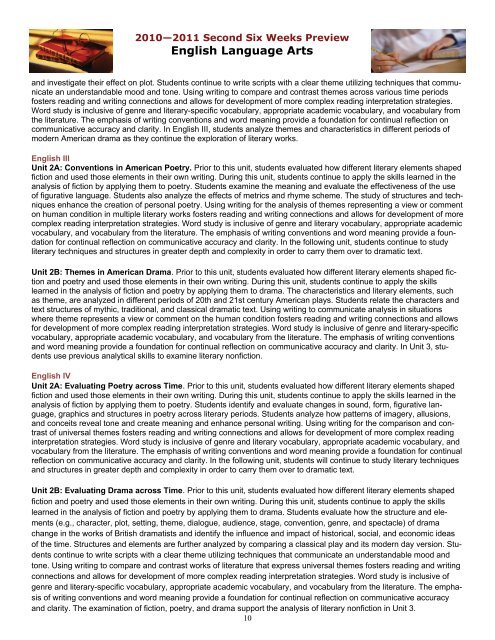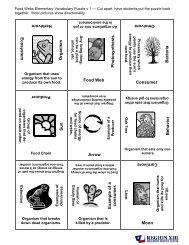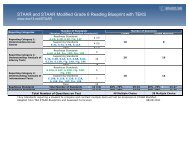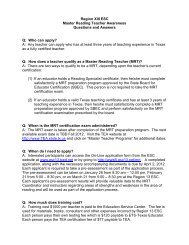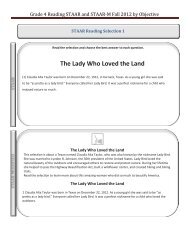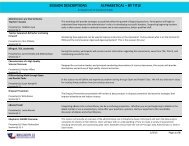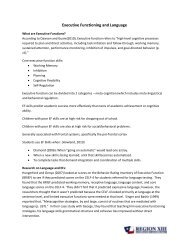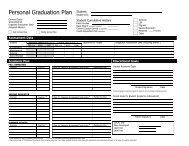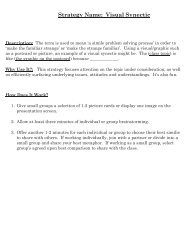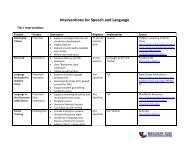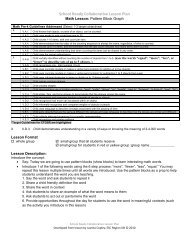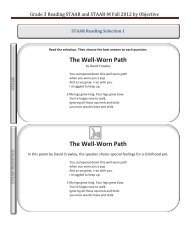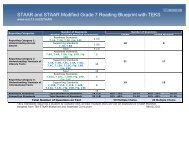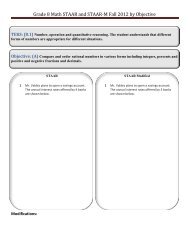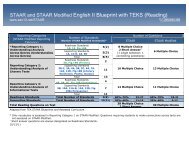2nd Six Weeks Newsletter - Region 13
2nd Six Weeks Newsletter - Region 13
2nd Six Weeks Newsletter - Region 13
Create successful ePaper yourself
Turn your PDF publications into a flip-book with our unique Google optimized e-Paper software.
2010—2011 Second <strong>Six</strong> <strong>Weeks</strong> PreviewEnglish Language Artsand investigate their effect on plot. Students continue to write scripts with a clear theme utilizing techniques that communicatean understandable mood and tone. Using writing to compare and contrast themes across various time periodsfosters reading and writing connections and allows for development of more complex reading interpretation strategies.Word study is inclusive of genre and literary-specific vocabulary, appropriate academic vocabulary, and vocabulary fromthe literature. The emphasis of writing conventions and word meaning provide a foundation for continual reflection oncommunicative accuracy and clarity. In English III, students analyze themes and characteristics in different periods ofmodern American drama as they continue the exploration of literary works.English IIIUnit 2A: Conventions in American Poetry. Prior to this unit, students evaluated how different literary elements shapedfiction and used those elements in their own writing. During this unit, students continue to apply the skills learned in theanalysis of fiction by applying them to poetry. Students examine the meaning and evaluate the effectiveness of the useof figurative language. Students also analyze the effects of metrics and rhyme scheme. The study of structures and techniquesenhance the creation of personal poetry. Using writing for the analysis of themes representing a view or commenton human condition in multiple literary works fosters reading and writing connections and allows for development of morecomplex reading interpretation strategies. Word study is inclusive of genre and literary vocabulary, appropriate academicvocabulary, and vocabulary from the literature. The emphasis of writing conventions and word meaning provide a foundationfor continual reflection on communicative accuracy and clarity. In the following unit, students continue to studyliterary techniques and structures in greater depth and complexity in order to carry them over to dramatic text.Unit 2B: Themes in American Drama. Prior to this unit, students evaluated how different literary elements shaped fictionand poetry and used those elements in their own writing. During this unit, students continue to apply the skillslearned in the analysis of fiction and poetry by applying them to drama. The characteristics and literary elements, suchas theme, are analyzed in different periods of 20th and 21st century American plays. Students relate the characters andtext structures of mythic, traditional, and classical dramatic text. Using writing to communicate analysis in situationswhere theme represents a view or comment on the human condition fosters reading and writing connections and allowsfor development of more complex reading interpretation strategies. Word study is inclusive of genre and literary-specificvocabulary, appropriate academic vocabulary, and vocabulary from the literature. The emphasis of writing conventionsand word meaning provide a foundation for continual reflection on communicative accuracy and clarity. In Unit 3, studentsuse previous analytical skills to examine literary nonfiction.English IVUnit 2A: Evaluating Poetry across Time. Prior to this unit, students evaluated how different literary elements shapedfiction and used those elements in their own writing. During this unit, students continue to apply the skills learned in theanalysis of fiction by applying them to poetry. Students identify and evaluate changes in sound, form, figurative language,graphics and structures in poetry across literary periods. Students analyze how patterns of imagery, allusions,and conceits reveal tone and create meaning and enhance personal writing. Using writing for the comparison and contrastof universal themes fosters reading and writing connections and allows for development of more complex readinginterpretation strategies. Word study is inclusive of genre and literary vocabulary, appropriate academic vocabulary, andvocabulary from the literature. The emphasis of writing conventions and word meaning provide a foundation for continualreflection on communicative accuracy and clarity. In the following unit, students will continue to study literary techniquesand structures in greater depth and complexity in order to carry them over to dramatic text.Unit 2B: Evaluating Drama across Time. Prior to this unit, students evaluated how different literary elements shapedfiction and poetry and used those elements in their own writing. During this unit, students continue to apply the skillslearned in the analysis of fiction and poetry by applying them to drama. Students evaluate how the structure and elements(e.g., character, plot, setting, theme, dialogue, audience, stage, convention, genre, and spectacle) of dramachange in the works of British dramatists and identify the influence and impact of historical, social, and economic ideasof the time. Structures and elements are further analyzed by comparing a classical play and its modern day version. Studentscontinue to write scripts with a clear theme utilizing techniques that communicate an understandable mood andtone. Using writing to compare and contrast works of literature that express universal themes fosters reading and writingconnections and allows for development of more complex reading interpretation strategies. Word study is inclusive ofgenre and literary-specific vocabulary, appropriate academic vocabulary, and vocabulary from the literature. The emphasisof writing conventions and word meaning provide a foundation for continual reflection on communicative accuracyand clarity. The examination of fiction, poetry, and drama support the analysis of literary nonfiction in Unit 3.10


